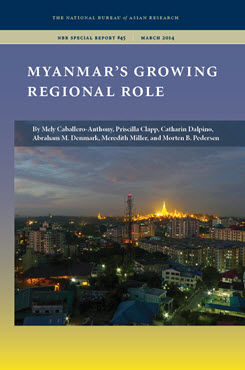Myanmar and Asia's New Great Game
This essay is part of the report “Myanmar’s Growing Regional Role,” which explores the issues surrounding Myanmar’s re-emergence as a regional power and outline implications for U.S. policy in relation to Myanmar and Southeast Asia as a whole.
EXECUTIVE SUMMARY
This essay examines the existing and emerging dynamics between Myanmar and Asia’s three major powers—China, India, and Japan—and assesses both the prospects for great‑power competition and the opportunities for future cooperation.
MAIN ARGUMENT
Myanmar’s domestic reforms have not only created the potential for the country to play a more significant role in the outside world; they have also opened the door for a more intensified geopolitical competition among Asia’s great powers. Myanmar’s indigenous resources and the potential of its nascent markets make it a ripening opportunity for economic engagement and development. Moreover, Myanmar’s geographic position puts it at the center of efforts to increase the interconnectivity of South and Southeast Asia with Northeast Asia, thereby greatly enhancing the country’s strategic value to the region’s established and emerging powers. Finally, China’s strong influence in Myanmar has driven Naypyidaw to work to diversify its external relationships, while similar concerns are simultaneously driving other Asian powers to check China’s rising power in South and Southeast Asia by enhancing their own relations with Myanmar.
POLICY IMPLICATIONS
- Although Myanmar seeks to diversify its international relationships so as to reduce its dependence on Beijing, it will continue to require a positive and robust relationship with China for the foreseeable future. However, Myanmar’s stronger ties with other foreign powers will likely force Beijing to take Naypyidaw’s interests and priorities into greater consideration.
- While Myanmar’s relations with India and Japan have rapidly expanded across a number of dimensions—especially in recent years—neither country yet enjoys influence on par with that of China. As these ties continue to improve and additional domestic political reforms are realized, observers should expect the influence of these two large Asian democracies to grow as well.
- Competition among Asia’s major powers will greatly influence the nature of Myanmar’s continued international reawakening. Yet despite these competitive dynamics, China, India, and Japan all share interests and goals in Myanmar that could serve as the basis for future cooperation and coordination.


